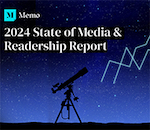Delivering the March 28 keynote address during Syracuse University’s Toner Prize, an annual awards ceremony that recognizes excellence in political reporting, President Obama took the opportunity to reprimand conduct prevalent in the media, where “there’s enormous pressure on journalists to fill the void and feed the beast with instant commentary, Twitter rumors and celebrity gossip and softer stories.”
Obama characterized the industry as one conferred with an obligation “to maintain certain standards.” Its job, he said, is “more than just handing someone a microphone.”
It’d be a gross understatement to say the media has been irresponsible in its coverage of the 2016 presidential election. The “news” anymore resembles a cultural extension of reality TV, another puerile entertainment outlet that on good days serves as Twitter’s greatest hits, aggregating stories popular on social media, and on (increasingly) bad days, resembles stenographers for the most divisive and caustic rhetoric imaginable from grandstanding simpletons posing as political leaders, a forum where opinion has more currency than fact, where outright lies are allowed to fly on-air unchallenged, where narrative-obedient anchors are entrusted to lob only the softest of softball questions, lest candidates threaten never to grace the network again with their ratings-boosting interviews.
There was an assumption, sometime last year, that policy talk would eventually crystallize in this election cycle, and its carnival overtones would eventually fade in a din of remember-when laughter. Needless to say, that never happened. Not only did the media fail to predict the converging social and economic forces that authored Donald Trump’s meteoric rise — a groundswell of working class whites who feel increasingly disenfranchised by a Republican establishment and find themselves galvanized by rhetoric against immigrants, terrorists and a scourge of political correctness — the networks encouraged and outright rewarded a political climate where salacious content got the most attention, where the most divisive candidates wrote the headlines and those who preferred to talk issues found themselves victims of a maddening circularity: they had no chance because the media wouldn’t cover them, and the media wouldn’t cover them because they had no chance.
Trump has bragged that he doesn’t need to advertise. And why would he? His minuscule campaign budget — he’s spent only about $10 million in ads so far, less than any other candidate — has been engendered by a historic salvo in media coverage. Trump in February accounted for an estimated $400 million in earned media, more than commentary on Ted Cruz and Hillary Clinton combined, and about the same amount John McCain spent during his entire 2008 presidential run, according to a March New York Times report on findings by mediaQuant. The networks have now essentially kept a phone line open for him, where he can call in and pontificate on-air regarding news of the day, which means, of course, an open forum to talk about himself. Former TV news correspondent Jeff Greenfield in March compared networks’ unedited airing of Trump rallies to state-owned television, telling CNN that the same phenomenon also occurred “when Fidel used to speak.”
Compare this to the attention the networks have given Bernie Sanders, which can be characterized as dismissive, perfunctory at best. The media decided Sanders either didn’t have a chance of winning the Democratic nomination, or that his platform — that an uneven distribution of income has hollowed out the middle class, that Wall Street has fleeced the masses and that our campaign finance laws and education system desperately need to be salvaged — simply didn’t make for compelling combat TV. Sanders has continued to receive a fraction of the coverage allotted to Trump, even as he’s managed to raise $140 million — essentially the largest grassroots campaign-funding achievement in history — his rallies have topped Obama’s historic 2008 assemblies in many cities and he currently beats Trump and Cruz by wider margins than Clinton in every general election poll. CNN, Fox News and MSNBC on March 15 ignored Sanders’ speech in Arizona because they were too busy filming an empty Trump podium. The same networks a week prior bumped Clinton’s speech after the Michigan and Mississippi primaries, choosing instead to keep the feed rolling as Trump promoted his line of wine and steaks. The “liberal media,” the greatest vanguard in rendering Trump’s ramshackle candidacy a self-fulfilling prophecy, has found a new formula for success in an era footnoted by shuttered newsrooms: that ignoble tradition of keeping the masses entertained at all costs, with a resolute unwillingness to discuss anything resembling real issues.
As insane as it sounds, the formula worked. Coverage of the 2016 presidential election has sent TV ratings soaring at the top networks. CNN this week reported its most-watched quarter in seven years. Fox News Channel, regularly the most-viewed network, for the first time also became the most-watched basic cable network in total day and prime time for the entire quarter. And after an abysmal 2015, MSNBC bounded back with its most-watched quarter since 2013. The media’s new lows in quality have converged with new highs in profits, and this bodes poorly for the future of the news. After this election is over, not only can we dispel the fiction that the news today exists to inform us, we can also be sure that things are only going to get worse.


 Trump Media & Technology Group today reported a $58.2M net loss on $4.1M in 2023 revenues, a disclosure that drove its stock price down 22.6 percent to $47.96.
Trump Media & Technology Group today reported a $58.2M net loss on $4.1M in 2023 revenues, a disclosure that drove its stock price down 22.6 percent to $47.96. Barry Pollack, an attorney at Wall Street’s Harris St. Laurent & Wechsler, has registered Julian Assange as a client with the Justice Dept. “out of an abundance of caution.”
Barry Pollack, an attorney at Wall Street’s Harris St. Laurent & Wechsler, has registered Julian Assange as a client with the Justice Dept. “out of an abundance of caution.” Paramount Global to slash 800 jobs in what chief executive Bob Bakish calls part of an effort to “return the company to earnings growth"... Rolling Stone editor-in-chief Noah Shachtman is exiting at the end of the month due to disagreements with chief executive Gus Wenner over the direction the magazine is taking... The New York Times broke the $1 billion barrier in annual revenue from digital subscriptions in 2023... Press Forward is investing more than $500 million to strengthen local newsrooms.
Paramount Global to slash 800 jobs in what chief executive Bob Bakish calls part of an effort to “return the company to earnings growth"... Rolling Stone editor-in-chief Noah Shachtman is exiting at the end of the month due to disagreements with chief executive Gus Wenner over the direction the magazine is taking... The New York Times broke the $1 billion barrier in annual revenue from digital subscriptions in 2023... Press Forward is investing more than $500 million to strengthen local newsrooms. The majority of news articles are read within the first three days of publication, according to a recent report.
The majority of news articles are read within the first three days of publication, according to a recent report. The Los Angeles Times gives pink slips to 115 people or 20 percent of its newsroom staff... TIME is also laying off about 30 employees, which is approximately 15 percent of its editorial staff... The Baltimore Banner, which was launched by Stewart Bainum in 2022 after he failed to buy the Baltimore Sun, added 500 subscribers per day in the three days following Sinclair Broadcast Group's deal to purchase the Sun.
The Los Angeles Times gives pink slips to 115 people or 20 percent of its newsroom staff... TIME is also laying off about 30 employees, which is approximately 15 percent of its editorial staff... The Baltimore Banner, which was launched by Stewart Bainum in 2022 after he failed to buy the Baltimore Sun, added 500 subscribers per day in the three days following Sinclair Broadcast Group's deal to purchase the Sun.


 Have a comment? Send it to
Have a comment? Send it to 
No comments have been submitted for this story yet.